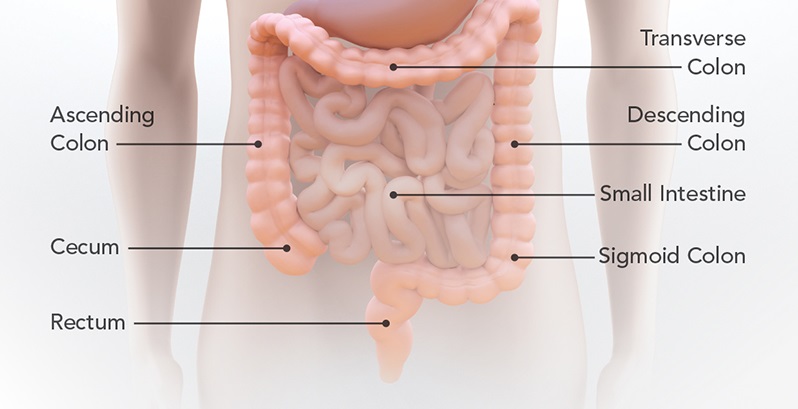SHARES

Colorectal cancer happens where abnormal cells divide uncontrollably forming a malignant tumour in the colon or rectum. This cancer deserves attention as it is the third most common type of non-skin cancer and the second leading cause of cancer deaths in United States.
Usually, colorectal cancer begins as a polyp, a growth in the tissue that lines the inner surface of the colon. Polyps occur very commonly, in 15-20% of adults. The prevalence increases with age particularly in people older than 50.
Most polyps are not cancerous, but a certain type of polyp – adenoma, carries a higher risk of turning malignant. When that happens, adenoma polyps grow very slowly on the wall of the colon taking 10-15 years to become cancer. Regardless, thanks to increase in colorectal cancer screening, the United States now sees a decline in new cancer cases and deaths.

The lower gastrointestinal system (Source: CDC)
When should I start screening for colorectal cancer?
Screening detects precancerous polyps for early removal before they turn cancerous. Besides that, it also catches colorectal cancer early to allow for timely treatment.
To begin with, the American Cancer Society recommends that people with average risk of colorectal cancer start screening at age 45. Nevertheless, most organisations seem to agree to start screening from age 50 – 75. Gernerally, colonoscopy should be done every 10 years and is not necessary beyond age 75. However, for those aged 76 to 85, you can still go for screening depending on preferences: life expectancy, overall health and prior screening history. Beyond 85, people should no longer need colorectal cancer screening.
On the other hand, if you have higher risks for colorectal cancer, you should consult your doctor. Your doctor will assess to recommend the best timing, frequency and the tests for screening. The higher risks include:
- Personal or family history of colorectal polyps or colorectal cancer
- Personal history of inflammatory bowel disease, such as Crohn’s disease or ulcerative colitis
- Confirmed or suspected genetic syndrome, including familial adenomatous polyposis (FAP) or Lynch syndrome
- Personal history of radiation therapy for cancer of the abdomen or pelvic area
What are the screening tests available?
There are 2 main groups of tests:
Stool tests
Stool tests detect blood or altered DNA in stool to screen for cancer or polyps. These tests may be preferred due to their less invasive nature. On top of that, patients can undergo stool tests with minimal preparation at the comfort of their own home. Stool tests are sufficient for screening only, and recommended to be done annually. A colonoscopy would be necessary if the stool results return positive.
These are some stool tests available:
Colonoscopy and Sigmoidoscopy – Visual structural exams
Visual exams observe the structure of the colon and rectum for any abnormal areas. The test is done either with a scope put into the rectum or special imaging tests. As more frequent tests provide little benefit, repeat these tests every 5 to 10 years in those with average risks. These tests usually require more preparation ahead of time. Furthermore, these examinations may carry certain risks not observed with stool tests.
These are some common visual exams:
- Flexible sigmoidoscopy
- Colonoscopy
- CT colonography (virtual colonoscopy)
What is the most suitable test for me?
The gold standard for diagnosing colorectal cancer is biopsy, with tissues obtained through colonoscopy. Nonetheless, this does not mean that colonoscopy is the “best test”. Discuss with your doctor to understand the pros and cons of each tests, and how often it should be carried out.
Generally, the decision would depend on:
- Personal preferences
- Personal medical condition
- Resources available for testing and follow-up
- Potential harm of the test
- Preparation required prior to the test
Conclusion
In summary, colorectal cancer is highly preventable if detected early through regular screening. Screening is advisable for those age 50 to 75. If you or your loved ones require a screening test, consult a doctor or make an appointment with a health screening centre as soon as possible.

Find a Colorectal Surgeon, Oncologist, in Malaysia, on GetDoc
Find a Colorectal Surgeon, Oncologist Health Screening Clinic in Singapore, on GetDoc
by Joanne Lee
Multipotentialite. Loves creating and seeing ideas come alive. View all articles by Joanne Lee.




